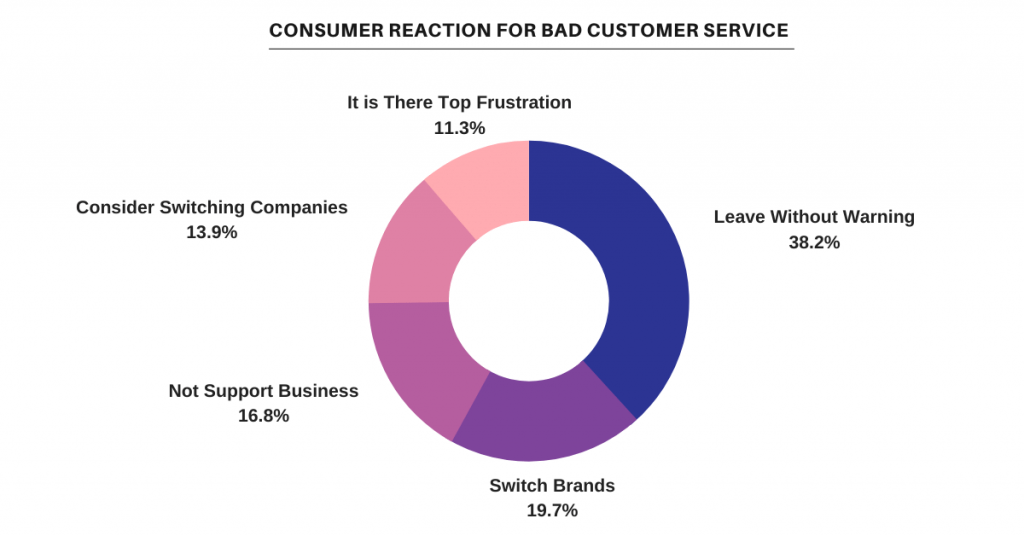A customer’s journey with your business doesn’t end at buying the ticket. It begins there and goes on to them enjoying the experience; it goes on to them associating the experience with your business.
Why is this important you ask?
With a shift in trends, the focus on travel and the desire to explore unexplored lands is the ‘new in thing’. From a business point of view, customer experience is crucial in ensuring retention and positive word of mouth advertising. Whether it’s addressing pre-trip inquiries, resolving issues during the journey, or providing personalized recommendations, responsive customer support teams play a vital role in enhancing the overall travel experience.
A recent report by OneClick tells us that 38.2% of consumers who have a bad customer service experience choose to leave the business. Additionally, 19.7% choose to switch brands, while the remaining 42% decide against future business with the same company.

Having established that retention is a key component that drives profit for businesses, it is important for businesses to ensure that customers are able to breeze through planning and living the journey.
From booking flights to navigating destinations, the travel industry relies heavily on robust customer support systems to ensure smooth experiences for every globetrotter. Let’s delve into why customer experience and support in travel is not just important but indispensable.
1 . Building Trust and Confidence
In an industry where uncertainty can often overshadow excitement, reliable customer support serves as a pillar of trust for travelers. Whether it’s answering pre-trip inquiries or providing assistance during unforeseen circumstances, responsive support teams instill confidence and peace of mind to customers. To achieve this, travel businesses should prioritize transparency, reliability, and responsiveness in their interactions with customers.
For example, airlines can build trust among its users by implementing a robust review system, like Insights, where customers can rate their experiences, fostering transparency and accountability. Additionally, investing in proactive support such as notifying the customers about delays due to weather or change in itinerary can help them prepare themselves and avoid the element of shock.
“77% of customers have a more favorable view of brands that ask for and accept customer feedback”
Microsoft
2. Handling Emergencies and Unexpected Situations
Travel is not without its share of surprises, from flight delays and cancellations to lost luggage and medical emergencies. In such challenging times, prompt and compassionate customer support becomes a lifeline for travelers, offering assistance, guidance, and reassurance when they need it most. How travel businesses handle these emergencies can significantly impact customer satisfaction and loyalty.
An ideal scenario of handling such situations will be airlines investing in proactive measures such as weather monitoring and flexible rebooking policies to minimize the impact of disruptions on travelers.
“68% of customers have a more favorable view of brands that offer or contact them with proactive customer service notifications.”
Microsoft
3. Personalizing the Travel Experience
In today’s hyper-connected world, travelers seek personalized experiences that resonate with their unique preferences and interests. Customer support in travel plays a pivotal role in curating tailored experiences, whether it’s recommending services, arranging special accommodations, or providing insider tips from local experts.
According to a study by Accenture, 91% of consumers are more likely to shop with brands that provide relevant offers and recommendations.
Travel businesses can leverage data analytics and AI-driven technologies to personalize the travel experience for their customers. For instance, airlines can use loyalty programs to collect data on traveler preferences and behavior, allowing the airlines to offer personalized recommendations and perks to its members.
4. Enhancing Customer Satisfaction and Loyalty
Exceptional customer support goes beyond resolving issues; it leaves a lasting impression on travelers, turning ordinary trips into unforgettable experiences. By delivering proactive, empathetic, and personalized support, travel brands can not only satisfy customers but also earn their loyalty and advocacy, paving the way for repeat business and positive word-of-mouth.
For example, in a scenario where a traveler’s flight was canceled, the travel agency’s support team provides proactive and personalized assistance, upgrading the seat and salvaging the vacation. The exceptional service will not only secure the traveler’s loyalty but also generate positive word-of-mouth, attracting new customers.
“96% of respondents say customer service is important in their choice of loyalty to a brand.”
Microsoft
Key Components Of Effective Customer Service
Running a travel business isn’t just about selling vacations. It’s about crafting experiences that start the moment a customer reaches out. But if you want to grow you need to go beyond the basics.
So, how do you turn a standard service into something unforgettable? Let’s break it down.
Speed & Reliability: The Non-Negotiables
No one likes waiting, especially when they are planning for a trip. Be it just an inquiry on flight options or a last-minute issue for a hotel, speed matters. But speed alone isn’t enough—you need to be consistently reliable. If a traveler gets different answers from different agents, they’ll lose confidence in your service. And in an industry where trust is everything, that’s a risk you can’t afford.
Kindness Wins Every Time
Ever had a frustrating experience with customer service and a kind, understanding agent turned it better? People remember how you make them feel, especially when travel plans go sideways. A delayed flight, a lost reservation, a visa hiccup—these moments can be stressful. A genuinely empathetic response can make all the difference.
Branding: More Than Just a Logo
Your brand isn’t just about colors and fonts. It’s about how customers perceive you at every touchpoint. A sleek website, a well-designed chatbot, and professional communication all contribute to the trust factor. If your branding screams premium but your customer service feels disorganized, there’s a disconnect—and customers will notice.
Personalization: The Travel Agent’s Superpower
Here is the situation. A customer books a trip to Italy. In reaching out for assistance, your agent says, “Excited for your Amalfi Coast adventure next month?” That small touch turns a generic interaction into a personal one. The best part? You don’t have to memorize every detail—AI-powered customer service tools can track preferences and past interactions, allowing your team to pick up right where the chatbot left off.
Multilingual Support: Speaking Your Customer’s Language—Literally
Travel is global. Your customer service should be too. A tourist from Japan booking a European rail pass will have a smoother experience if they can get help in their native language. Even basic multilingual support—whether through AI translation tools or a diverse customer service team—can make a huge difference.
Conclusion:
It goes without saying that a happy customer is your biggest asset especially in the travel industry customer support solutions, where experiences are paramount, an exceptional customer experience is the key to unlocking their satisfaction and loyalty. Each conversation with your travel customer support team counts. Each conversation is a potential to build a repeat customer and an advocate for your brand. Is your support team equipped with the right tools to tackle their expectations and queries?
FAQs
1 How does personalized customer support enhance the travel experience?
This service can provide individualized assistance for clients, thereby ensuring smooth transitions of the services offered. It provides individual recommendations for an easy experience. Priority assistance along with updates reduces provision stress and increases the level of satisfaction. Airlines, hotels, and travel agencies provide customized deals through personalized interactions and travel e-commerce customer support for enhanced patronage and customer journeys.
2 what is customer service in airlines
Airline customer services include anything that involves booking tickets, checking-in, handling baggage claims, rescheduling flights, and other inquiries made by their passengers. It is what keeps smooth travel experiences and makes assistance available in airports, in air, or on digital channels. Excellent service is said to increase passenger satisfaction and improve the brand itself.
3 What is the biggest challenge for the tourism sector?
The biggest challenge is in managing the reality of business changes in a turbulent environment with fluctuating economic factors and changing traveler expectations as a priority. Besides, factors like sustainability, overtourism, labor shortages, and digital transformation also influence the industry’s success for the long term.
4 Why is customer support essential in the travel industry?
Travel customer service resolves issues such as booking problems, cancellations, and itinerary changes and makes your travel smooth. It would enhance customer trust, mitigate disruptions, and provide help during emergencies and can thus be the connecting link for smooth and enjoyable travel experiences.
5 How does technology improve customer service?
Technology makes customer service faster, smarter, and more personal. AI chatbots handle routine queries instantly, while data analytics help businesses anticipate needs before customers even ask. Omnichannel support—chat, email, social media—keeps interactions seamless. The result? Happier customers, fewer headaches, and stronger brand loyalty.








